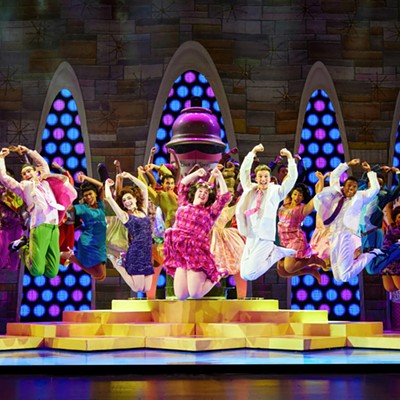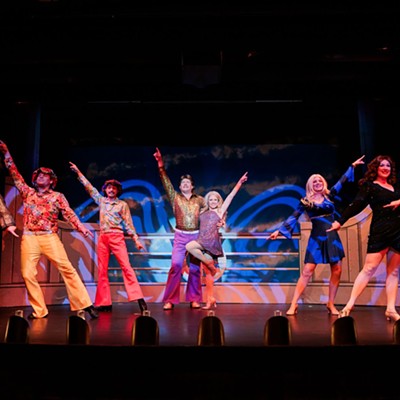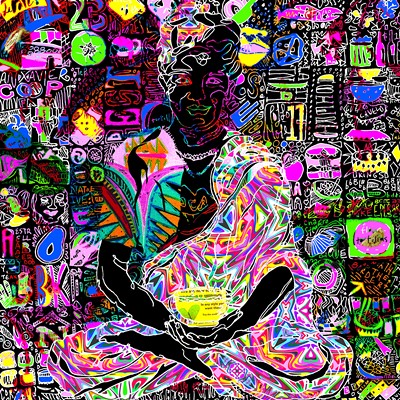When the marvelous and more than slightly mad Mel Brooks labored to write and direct his first full-length movie, The Producers, it was 1967 and a tumultuous culture clash was happening outside the rehearsal room (or rooms, actually, since there was a need to bounce around because of money issues). The production process was tumultuous—by most accounts as volatile as a really bad marriage. Brooks was hyper-controlling; star Zero Mostel was the victim of turbulent mood swings that spilled onto the already strained process; and Brooks hadn't been able to secure the best producers of the day, who were committed to fostering a little movie called The Graduate.
Brooks' movie, about a has-been Broadway producer who grants sexual favors to older women to raise the cash for his shows, was really sort of a flop. But he kept bringing us movies like Blazing Saddles, High Anxiety, and Young Frankenstein, far from an unimpressive comeback. Decades later, producer David Geffen suggested to Brooks that The Producers might make a terrific Big Broadway Musical, but when Brooks asked composer/lyricist Jerry Herman contribute, Herman declined, saying that Brooks was a fine songwriter himself. So, Brooks wrote the lyrics and had help with the music. The book was written by Brooks and Thomas Meehan and direction and choreography were by Susan Stroman.
To say it was a hit is an understatement. It had $17 million in pre-New York sales. It opened in April 2001, immediately became THE show to see, earned 12 Tony Awards, more than any other show had at the time. It closed its Broadway run in 2007.
There was Nathan Lane as Max Bialystock, the lowbrow producer, and Matthew Broderick as Leo Bloom, the young accountant who figured out that one could actually make more on a flop than a hit. The team's flop-destined show, Springtime for Hitler, was so outrageous, so tasteless so over-the-top they figured there was no way it could do anything but crater. But it didn't. People can be unpredictable, and theater is a fickle thing. Now what happens?
It's enormously expensive to produce a musical. And this is a really big musical. Way past the capabilities of most theaters.
But there it is, a grandly funny behemoth, a beyond merely satiric bully daring theater groups to take on its big cast and big score, laughing as it dangles a smash-hit carrot just out of reach.
Kevin Johnson isn't afraid of bullies. The founder and artistic director of Arizona Onstage Productions has produced and directed very respectable productions of Sweeney Todd and Les Miserables, as well as a number of much smaller, more intimate musicals and revues.
But The Producers? "It's so outrageous and satirical and funny," Johnson said. "I thought it would be a much-needed way for people to just laugh and enjoy themselves since the last few months have been so tense."
Johnson says he doesn't elect to do a show until he knows he has the right people for it. "With Dennis [Tamblyn] and Matt [Holter] I knew I could finally do this." And, he says, he had the perfect director, theater veteran Annette Hillman. He has directed most of AOP's shows but claims that he does better with shows "where people are dying and being burned. Annette is perfect for this. She brings such effervescence and heart. She makes things look so seamless. And she is on this show like a mother bear and her cubs."
Hillman, a theater pro with an MFA in performance from Purdue, has taken time off from her chosen profession to raise two children, now 19 and 16. "It was important for me to be there," Hillman says, but, she jokes, "now they don't care about me anymore." Yet she has found her way back into the theater world. She's directing more than acting, mostly because there are "few good roles for women of a certain age."
But she's never directed something this big. In fact, her voice trailed off several times as she talked about the size and complexities of this show. But she has no regrets or doubts about their efforts.
Her inventory of the project: It has a cast of 34 plus 20 volunteers to help wrangle the show; there are four costumer designers and a milliner; two choreographers; 300-plus costumes and countless props. Rehearsals began at the end of May, but they've had to accommodate family vacations and such. In fact, she says that scheduling rehearsals has probably been the single most difficult part of the process.
"I and my production manager have sat with spreadsheets for hours" to find times when all those in a scene would be available. "We've rehearsed this show more like doing a film," she adds, about how scenes are not worked in the order they appear in the show.
Some of the younger folks learned "how to be showgirls and to tap and to work in different styles—important skill sets," she laughs. "They have worked so hard and without complaint—at least within my earshot. Everyone has. This has been so fun. Hard but fun. The rehearsal process has been harmonious. I've never dreaded once going to rehearsal. We're a family and love one another, as well as what we're doing. I hope that comes through."
I wondered if the past weekend's deadly white-supremacy display in Virginia might make some a bit hesitant to laugh at the show within a show, with its Nazi flags and storm trooper swastika armbands.
Hillman, who is Jewish, weighed in. Mel Brooks was trying "to take the power away from Hitler and he does that with comedy. The swastika in this show is a symbol of stupidity, ignorance and hate. Since what happened this weekend I feel more strongly that the symbol stands for hate. . . .we will proceed as Mr. Brooks intended."








